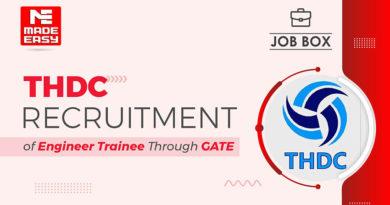Top 10 Common Mistakes to Avoid in B.E./B.Tech
Getting admissions into the dream engineering college for any student does seem like a goal has been accomplished. But if a student thinks that getting into a prestigious engineering college is where your goal is achieved, one is living in a big bubble. The real journey begins where you have to hustle between multiple things which involves dealing with challenges that come while trying hard to excel in academics such as working on practical skills, putting continuous effort into building a successful career, taking care of your health, dealing with personal responsibilities, and thinking of growth beyond the college, etc. Well, a student has to cope with various things at a time, our blog can guide you through putting in a continuous effort to build a successful career while avoiding mistakes in your B.E./B.Tech journey.
While you are embarking on a Bachelor of Engineering (B.E.) or Bachelor’s in Technology (B.Tech), it seems to be an exciting journey. Pursuing an engineering degree is a new phase of your academic life, which normally comes with excitement and nervousness. While students experience a rush of excitement for new things, they also have to deal with the academic challenges, so it is crucial to be aware of the common mistakes in the B.E./B.Tech journey so that you can make the most of your college days.
Usually we talk about academic-related topics, but this blog is very different where we’ll talk about the common pitfalls a future engineer may experience in their college life. And how you can avoid them, which will eventually lead you to build a successful career along with overall personality development that benefits them throughout their life.
Top 10 Common Mistakes to avoid in B.E./B.Tech
Once you are enrolled in an engineering college, you’ll receive several pieces of advice that can be either good or bad. If you are an engineering student, read further to know the common mistakes one can experience and how you can avoid them to secure your career and overall development.
1. Entire focus on acquiring good grades:
While a student pursues an engineering degree to have a desired career and to build that, they give their entire focus on getting a good CGPA. We accept that scoring good marks is important, but you cannot ignore your overall development. A good CGPA will definitely get you called for the job interview, but it gives no assurance that you will get the job. Companies look for a complete package while hiring a candidate. They evaluate your practical skills, critical thinking ability, and overall development along with good grades. So focus on enhancing your practical skills and overall development with good grades that will help you get through the interview.
2. Not indulging in practical skills:
To build a base, it is important to have theoretical knowledge. But lack of practical skills can lead to the rejection of job opportunities. Engineering is all about the practical application, so it is very important to build practical skills in the B.E. or B.Tech journey. Companies recruit candidates who have experience in real environments, so invest your time in lab work, projects, workshops, and internships that will give you the hands-on experience employers look for.
3. No strong fundamentals:
Lecturers and top rankers have always suggested having a strong grasp on the core subject. This is crucial because it helps in the development of the subject/concept at the advanced level. Clear fundamentals can also be helpful in scoring good grades along with viva voce in your semester exams, as well as building your problem-solving skills. Working on complex concepts will be easier if one has a strong grasp on mathematics, physics, and basic engineering topics.
4. Ignoring communication skills
Good grades, practical knowledge, and critical thinking skills are very crucial to crack the engineering job interview. But if you can’t communicate these skills well, you can’t sustain them. Good communication skills are very important to make a genuine impression on the interviewer. So it’s better to start working on your communication skills while pursuing your B.E. or B.Tech degree. Learning to express yourself, interact with lots of people, give presentations, and participate in group discussions are some very common yet effective techniques to work on communication skills. Engineers who have better communication skills tend to have better employment, higher wages, and growth opportunities. So having good communication skills is as important as having practical skills.
5. Avoid developing soft skills:
To sustain yourself in the job market with growth opportunities will be difficult if you don’t have soft skills like adaptability, leadership, and problem-solving skills. It will be beneficial to participate in extracurricular activities and other opportunities where you develop your soft skills.
6. Not building a network:
Getting yourself so much into academics that engineering students tend to forget networking. Many students fail to connect with professors, industry experts, and peers outside their circle, which can limit their career growth and job opportunities. It is advisable to attend seminars, industry conferences, and alumni meets. Building meaningful relationships early can lead you to leadership, mentorships, and job referrals.
7. Not planning the actual goals:
B.E. or B.Tech college phase is the phase where students must plan their actual goals. Usually students wait until the final year, but this mistake should be avoided. The actual career goals and career planning must be done on priority. Seek advice from career counselors, attend placement workshops, and do research on potential career paths, which will help you explore career paths thoroughly and make a wise decision. But all this must be started while in the second or third year of college, as the final year is filled up with multiple stuff like projects, final exams, and placement activities.
8. Not keeping updated with latest trends:
Engineering is one of the sectors that experience frequent changes and evolution. College students must keep themselves updated with industry trends like developments and technologies, and if ignored, one can lag behind. Reading industry publications, attending seminars, and using the internet as the right source of knowledge will help you keep up to date.
9. Studying last moment:
Students usually indulge in last-minute preparation, which is the most common mistake they make. Last-minute preparation might help you get good marks, but the stress and poor knowledge will be visible later on. So engineering students must avoid last-minute studying, which will eventually lead to stress, overflow of knowledge, and poor performance. It is beneficial to have a time-managing schedule and regular study routine, which will give you a strong grasp on the concept, a better retention rate, and less stress and anxiety during the exam phase. The last-minute phase should be reserved for revision, reviewing previous year questions, and going through short notes.
10. Ignoring mental and physical health:
Between the hustle of academics and learning certain skills for overall development, engineering students often overlook their mental and physical health. It is very important to take good care of both of your health. Pushing yourself too much in performing well in semester exams can lead to burnout, resulting in harming your health. It is highly recommended to stay away from the intoxications. Taking short breaks, indulging in your favorite hobbies, balancing your study routine with regular physical activities and exercises, and most importantly, a balanced diet are some useful tips to look after your mental and physical health.
These are some of the common mistakes that engineering students make in their B.Tech journey, and they can be avoided in the best possible way. We accept the fact that maintaining a study schedule, managing time to learn and develop skills, along with taking breaks and looking after the mental as well as physical, all of them seem difficult but aren’t impossible. We have created this blog for the students who have recently enrolled in an engineering degree or dream of joining an engineering college. And so knowing about the common mistakes priorly can benefit you in taking the required steps.
EASY STEP Course
As we talked above about how important it is to have strong fundamentals, the MADE EASY initiative’s EASY STEP course is curated for students to have a strong grasp on basic concepts of engineering. It focuses on providing quality lectures for B.E./ B.Tech students. The aim is to make students ‘engineers by profession and not just a degree’ that caters to core subjects with aptitude and certain IT subjects. The course eventually will benefit the students to have strong fundamentals, resulting in scoring well in semester exams and college placements.
Visit the website to know more about:
EASY STEP – Basic Concepts of Engineering
FAQ
1. Which is the best course to pursue after B.E /B.Tech?
Ans. The best course to pursue after B.E. /B.Tech totally depends on the actual goals and interests of the student.
2. What is B.E./B.Tech?
Ans. B.E. is Bachelor of engineering and B.Tech is Bachelor of technology. Both are engineering degrees which are awarded to college graduates majoring in engineering discipline at higher education institutions.
3. What are the popular branches/specializations in B.Tech?
Ans. Some of the popular branches in B.Tech are Computer Science Engineering, Mechanical Engineering, Electrical and Electronics Engineering, Information Technology, Civil Engineering, and Biomedical Engineering which have potential growth.
Some popular specializations in B.Tech are Artificial Intelligence and Machine Learning, Electronics Engineering, Chemical Engineering, Biotechnology Engineering, Cyber Security, Cloud, DevOps, and Automation,
Gaming Technology, Smart Manufacturing and Automation, Automobile Engineering and Power Engineering are rapidly growing.
4. What is the difference between B.E. and B.Tech?
Ans. B.E. and B.Tech both are engineering degrees but they differ in their focus and approach.
- B.E. degree focuses on theoretical understanding and fundamental principles.
- B.Tech degree focuses on practical application and skill development.
5. What career opportunities are available after completing B.E./B.Tech?
Ans. There are a variety of career options after completing B.E./B.Tech such as engineering roles in private and government sectors, government jobs like civil services, banking sector, SSC or railways. They can even opt to pursue higher education or even an entrepreneurial path.
Dear Aspirants,
Your preparation for GATE, ESE, PSUs, and AE/JE is now smarter than ever — thanks to the MADE EASY YouTube channel.
This is not just a channel, but a complete strategy for success, where you get toppers strategies, PYQ–GTQ discussions, current affairs updates, and important job-related information, all delivered by the country’s best teachers and industry experts.
If you also want to stay one step ahead in the race to success, subscribe to MADE EASY on YouTube and stay connected with us on social media.
MADE EASY — where preparation happens with confidence.

MADE EASY is a well-organized institute, complete in all aspects, and provides quality guidance for both written and personality tests. MADE EASY has produced top-ranked students in ESE, GATE, and various public sector exams. The publishing team regularly writes exam-related blogs based on conversations with the faculty, helping students prepare effectively for their exams.




